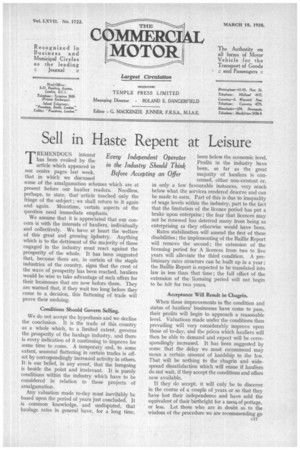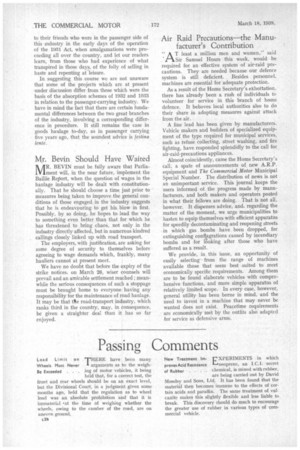Sell in Haste Repent at Leisure
Page 63

Page 64

If you've noticed an error in this article please click here to report it so we can fix it.
Every Independ era Operator in the Industry S hould Think Before Acceptin g an Offer REMENDOUS interest has been evoked by the article which appeared in our centre pages last week, that in which we discussed some of the amalgamation schemes which are at present before our haulier readers. Needless, perhaps, to state, that article touched only the fringe of the subject ; we shall return to it again and again. Meantime, certain aspects of the question need immediate emphasis.
We assume that it is appreciated that our concern is with the interests of hauliers, individually and collectively. We have at heart the welfare of this great and growing ivlustry. Anything which is to the detriment of the majority of those engaged in the industry must react against the prosperity of the whole. It has been suggested that, because there are, in certain of the staple industries of the country, signs that the crest of the wave of prosperity has been reached, hauliers would be wise to take advantage of such offers for their businesses that are now before them. They are warned that, if they wait too long before they come to a decision, this flattening of trade will prove their undoing.
Conditions Should Govern Selling.
We do not accept the hypothesis and we decline the conclusion. It is the trade of this country as a whole .which, to a limited extent, governs the prosperity of the haulage industry, and there is every indication of it continuing to improve for some time to come. A temporary and, to some extent, seasonal flattening in certain trades is offset by correspondingly increased activity in others. It is our belief, in any event, that the foregoing is beside the point and irrelevant. It is purely conditions within the industry which have to be considered in relation to these projects of amalgamation.
Any valuation made to-day must inevitably be based upon the period of years just concluded. It is common knowledge, and undisputed, that haulage rates in general have, for a long time, been below the economic level. Profits in the industry have been, so far as the • great majority of hauliers is concerned, either non-existent or, in only a few favourable instances, very much below what the services rendered deserve and can be made to earn. Part of this is due to inequality of wage levels within the industry, part to the fact that the limitation of the licence period has put a brake upon enterprise ; the fear that licences may not be renewed has deterred many from being as enterprising as they otherwise would have been.
Rates stabilization will amend the first of these disabilities ; the implementing of the Baillie Report will remove the second ; the extension of the licensing period for A licences from two to five years will alleviate the third condition. A preliminary rates structure can be built up in a year ; the Baillie Report is expected to be translated into law in less than that time ; the full effect of the extension of the licensing period will not begin to be felt for two years.
Acceptance Will Result in Chagrin.
When these improvements in the condition and status of hauliers' businesses have come to pass, their profits will begin to approach a reasonable level. Valuations made under the conditions then prevailing will very considerably improve upon those of to-day, and the prices which hauliers will then be able to demand and expect will be correspondingly increased. It has been suggested by some that the delay we must recommend may mean a certain amount of hardship to the few. That will be nothing to the chagrin and widespread dissatisfaction which will ensue if hauliers do not wait, if they accept the conditions and offers now available.
If they do accept, it will only be to discover in the course of a couple of years or so that they have lost their independence and have sold the equivalent of their birthright for a mess of pottage, or less. Let those who are in doubt as to the wisdom of the procedure we 8.re recommending go to their friends who were in the passenger side of this industry in the early days of the operation of the 1931 Act, when amalgamations were proceeding all over the country, and let our readers learn, from those who had experience of what transpired in those days, of the folly of selling in haste and repenting at leisure.
In suggesting this course we are not unaware that some of the projects which are at present under discussion differ from those which were the basis of the absorption schemes of 1932 and 1933 in relation to the passenger-carrying industry. We have in mind the fact that there are certain fundamental differences between the two great branches of the industry, involving a corresponding difference in procedure. It still remains the case in goods haulage to-day, as in passenvr carrying five years ago, that the soundest advice is festina lente.
Mr. Bevin Should Have Waited
AR. BEVIN must be fully aware that ParliaI Vlment will, in the near future, implement the Baillie Report, when the question of wages in the haulage industry will be dealt with constitutionally. That he should choose a time just prior to measures being taken to improve the general conditions of those engaged in the industry suggests that he is endeavouring to get his blow in first. Possibly, by so doing, he hopes to lead the way to something even better than that for which he has threatened to bring chaos, not only in the industry directly affected, but in numerous kindred callings closely linked up with road transport.
The employers, with justification, are asking for some degree of security to themselves before agreeing to wage demands which, frankly, many hauliers cannot at present meet.
We have no doubt that before the expiry of the strike notices. on March 26, wiser counsels will prevail and an amicable settlement reached ; meanwhile the serious consequences of such a stoppage must be brought home to everyone having any responsibility for the maintenance of road haulage. It may be that die road-transport industry, which ranks third in the country, may, in consequence, be given a straighter deal than it has so far enjoyed.
Air Raid Precautions—the Manufacturer's Contribution
A T least a million men and women," said Sir Samuel Hoare this week, would be required for an effective system of air-raid precautions. They are needed because our defence system is stilt deficient. Besides personnel, machines are essential for adequate protection.
As a result of the Home Secretary's exhoitation, there has already been a rush of individuals to volunteer for service in this branch of home defence. It behoves local authorities also to do their share in adopting measures against attack from the air.
A fine lead has been given by manufacturers. Vehicle makers and builders of specialized equipment of the type required for municipal services, suCh as refuse collecting, street washing, and fire fighting, have responded splendidly to the call for air-raid-precautions appliances.
Almost coincidently, came the Home Secretary's call, a spate of announcements of new A.R.P. equipment and The Commercial Motor Municipal Special Number. The distribution of news is not an unimportant service. This journal keeps the users informed of the progress made by manufacturers, and both makers and operators posted in what their fellows are doing. That is not all, however. It dispenses advice, and, regarding the matter of the moment, we urge municipalities to hasten to equip themselves with efficient apparatus for speedily decontaminating and reopening streets in which gas bombs have been dropped, for extinguishing conflagrations caused by incendiary bombs and for looking after those who have suffered as a result.
We provide, in this issue, an opportunity of easily selecting from the range of machines available those that seem best suited to meet economically specific requirements. Among them are to be found elaborate vehicles with comprehensive functions, and more simple apparatus of relatively limited scope. In every case, however, general utility has been borne in mind, and the need to invest in a machine that may never be wanted does not exist. Peacetime requirements are economically met by the outfits also adapted for service as defensive arms.












































































































































